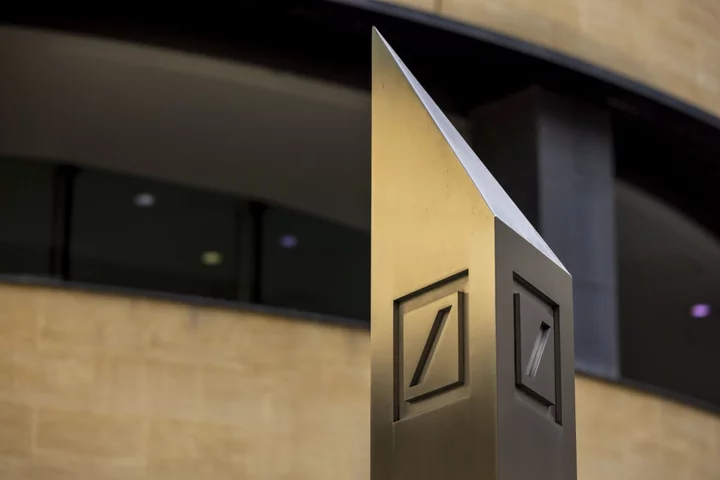Deutsche Bank AG weathered the trading slowdown better than analysts had expected, in the first indication how Europe’s investment banks fared in a challenging quarter for the business.
Fixed-income trading, the largest single revenue contributor, declined 10% in the second quarter, ahead of most of large Wall Street banks, which in aggregate saw a drop of 13% from a year earlier. Expenses rose 15%, more than analysts had expected, reflecting severance payments and litigation costs.
Chief Executive Officer Christian Sewing has vowed to further increase revenue and profitability and late Tuesday announced a €450 million ($500 million) buyback, seeking to lift a share price that remains below the level when the took over five years ago. But the slowdown in trading and signs that the lift from higher interest rates may be waning have complicated that challenge and forced him to balance investments with more costs reductions.
Deutsche Bank in April announced plans to cut about 800 senior back-office staff, one day before agreeing to buy UK corporate brokerage Numis Plc in Sewing’s first major deal as CEO.
The Numis deal, Deutsche Bank’s largest since 2009, is a £410 million ($526 million) bet that the advisory and underwriting businesses will come back from an industry-wide slump. Most Wall Street giants beat estimates for equity and debt underwriting last quarter in a sign of life for the business.
At Deutsche Bank, revenue from origination and advisory rose 25%, as the bank didn’t repeat valuation adjustments it made a year earlier. The business makes up a relatively small part of the investment bank and is dwarfed by the trading desk.
Deutsche Bank had warned that last month that trading revenue in the second quarter could drop between 15% and 20%, though Sewing also indicated that he expects the business to improve in the second half, with momentum returning after the US resolved the debt ceiling impasse.
To make up for the trading slowdown, the CEO had been leaning more on the corporate and private bank. But signs are mounting that the lift from higher interest rates that fueled growth at the two lending businesses is waning. Demand for loans among companies in the euro zone plunged by the most on record in the second quarter, a report showed Tuesday.
The corporate bank reported a 25% jump in revenue in the quarter, while the private bank saw a gain of 11%.
Sewing has set a target for a return on tangible equity, a measure of profitability, of at least 10% by 2025, and recently indicated that the lender may exceed that goal.

